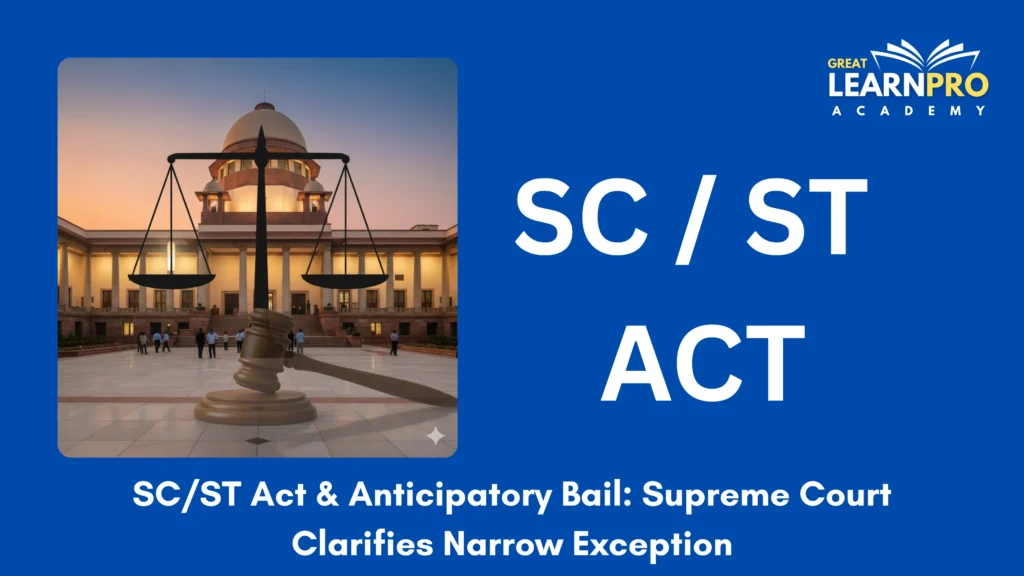
New Delhi (September 2025): The Supreme Court has reaffirmed the strict bar on anticipatory bail under Section 18 of the Scheduled Castes and Scheduled Tribes (Prevention of Atrocities) Act, 1989, while carving out a narrow exception: courts may grant pre-arrest bail only where the FIR, on its face, does not disclose a prima facie offence under Section 3 of the Act. The ruling came in Kiran v. Rajkumar Jivraj Jain & Anr., decided on September 1, 2025, by a three-judge bench led by CJI B.R. Gavai with Justices K. Vinod Chandran and N.V. Anjaria.
The Case
The appellant Kiran, a member of a Scheduled Caste, lodged an FIR in November 2024 in Dharashiv (Osmanabad), Maharashtra, alleging that Rajkumar Jivraj Jain and others assaulted him with an iron rod, threatened to burn his house, and abused him and his female relatives with caste slurs (“Mangtyano”) after he voted against the accused’s preferred candidate in the Assembly elections. The FIR invoked several offences under the Bharatiya Nyaya Sanhita (BNS) and Sections 3(1)(o), 3(1)(r), 3(1)(s) and 3(1)(w)(i) of the SC/ST Act. The Sessions Court refused anticipatory bail; the Bombay High Court (Aurangabad Bench) nevertheless granted it, terming the case exaggerated/politically motivated.
The Issue
Whether Section 18 of the SC/ST Act which excludes the application of Section 438 CrPC (anticipatory bail) absolutely bars pre-arrest bail in every case under the Act, or whether courts retain a limited discretion to grant anticipatory bail where no prima facie SC/ST offence is disclosed in the complaint/FIR.
The Supreme Court’s Holding
The Court reiterated that Section 18 creates an absolute bar to anticipatory bail for persons facing specific accusations under the SC/ST Act. However, it clarified a rider: if, on a plain reading of the FIR, a prima facie offence under Section 3 is not made out and the accusations are devoid of merit, the court may exercise discretion to grant anticipatory bail under Section 438 CrPC. This threshold test must be applied without converting the bail hearing into a mini-trial or venturing into the evidentiary realm; the decision hinges on a first-blush assessment of the FIR’s averments. Quoting the Court’s formulation as reported by LiveLaw: where “on the face of it the offence under Section 3 of the Act is found to have not been made out… the Court has a room to exercise the discretion to grant anticipatory bail.” Conversely, if the FIR discloses the ingredients of the offence, the bar applies in full, and anticipatory bail is impermissible.
Application to the Facts
Applying these principles, the bench held that the ingredients of Section 3 were prima facie satisfied: the alleged abuses by caste name were uttered in public view and because of the complainant’s caste identity; the assault and threats (including threats to burn the house) reinforced the caste nexus. Consequently, the High Court’s grant of anticipatory bail, ignoring the Section 18 bar, was a jurisdictional error. The Supreme Court set aside the High Court order and cancelled anticipatory bail, clarifying that its observations were confined to the bail stage and would not prejudice the trial on merits.
Sources:
- https://www.livelaw.in/sc-judgments/2025-livelaw-sc-869-kiran-versus-rajkumar-jivraj-jain-anr-302847 (Live Law)
- https://www.barandbench.com/news/litigation/anticipatory-bail-under-scst-act-allowed-only-if-no-prima-facie-case-is-established-supreme-court (Bar and Bench – Indian Legal news)
More Current affairs: https://learnproacademy.in/updates/
